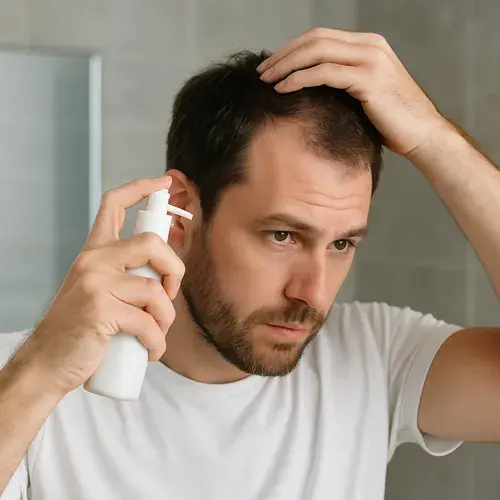Topical Treatments Beyond Minoxidil: Exploring Other Solutions Like Ketoconazole
Minoxidil is a popular hair loss treatment, but alternatives like ketoconazole, rosemary oil, and caffeine-rich oils offer promising,

Minoxidil, commonly known as Rogaine, is a widely used topical treatment for hair loss. However, it may not be suitable for everyone due to its side effects or the inconvenience of its twice-daily application. For those seeking alternative topical treatments, there are several options available that can address various forms of hair loss. One such alternative is ketoconazole, which has been gaining attention for its potential in treating scalp conditions and promoting hair growth. Understanding Minoxidil Before diving into the alternatives, it's essential to understand how minoxidil works. Minoxidil is a vasodilator that helps to increase blood flow to the scalp, which can stimulate hair growth. It is available in both topical and oral forms, with the topical version being more commonly used for treating male pattern baldness and female pattern hair loss. Ketoconazole: A Promising Alternative Ketoconazole is an antifungal medication that has been used to treat various scalp conditions such as dandruff and seborrheic dermatitis. However, it also has properties that make it a potential treatment for hair loss. Studies have shown that ketoconazole can help reduce inflammation and improve scalp health, creating an environment conducive to hair growth. How Ketoconazole Works Ketoconazole works by reducing the presence of fungi on the scalp, which can contribute to conditions like dandruff and seborrheic dermatitis. These conditions can lead to irritation and inflammation, which may slow down or even stop hair growth. By addressing these underlying issues, ketoconazole can help restore a healthy scalp environment. Other Topical Treatments While ketoconazole is a promising alternative, there are other topical treatments worth exploring: Rosemary Oil: This essential oil has been studied for its potential in promoting hair growth. Research suggests that rosemary oil can be as effective as minoxidil in boosting hair growth without causing the side effects associated with minoxidil, such as an itchy scalp. Camellia Tea Oil: Rich in vitamins A, B, C, and E, camellia tea oil delivers intense nourishment to neglected scalps and dull hair. It stimulates hair follicles and enhances the dermatological condition of the scalp, making it a viable natural alternative. Coffee Arabica Oil: This oil contains caffeine, which is a stimulant that boosts blood circulation to follicles. It helps in restoring healthy hair growth by offsetting the effects of DHT (dihydrotestosterone), a hormone that contributes to hair loss. Natural Remedies In addition to pharmaceutical alternatives like ketoconazole, there are numerous natural remedies that can be used to promote hair growth. These include: Herbal Supplements: Saw palmetto and rosemary oil are herbal supplements that have been studied for their potential in improving overall hair quality and density. Low-Level Laser Therapy (LLLT): LLLT uses low-level laser or light-emitting diodes to stimulate hair growth. It is a non-invasive treatment that can be used at home with specialized devices. Conclusion While minoxidil remains a popular choice for treating hair loss, it may not be suitable for everyone. Exploring other topical solutions like ketoconazole can provide effective alternatives that address different forms of hair loss. Understanding how these treatments work and combining them with natural remedies can help individuals achieve healthier, fuller hair. Always consult a healthcare professional before starting any new treatment regimen to determine the best course of action for your specific needs.
Need Professional Consultation?
Our professional doctors will provide detailed hair and scalp analysis and develop personalized treatment plans.
Book Consultation Now